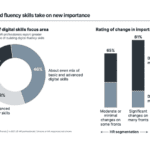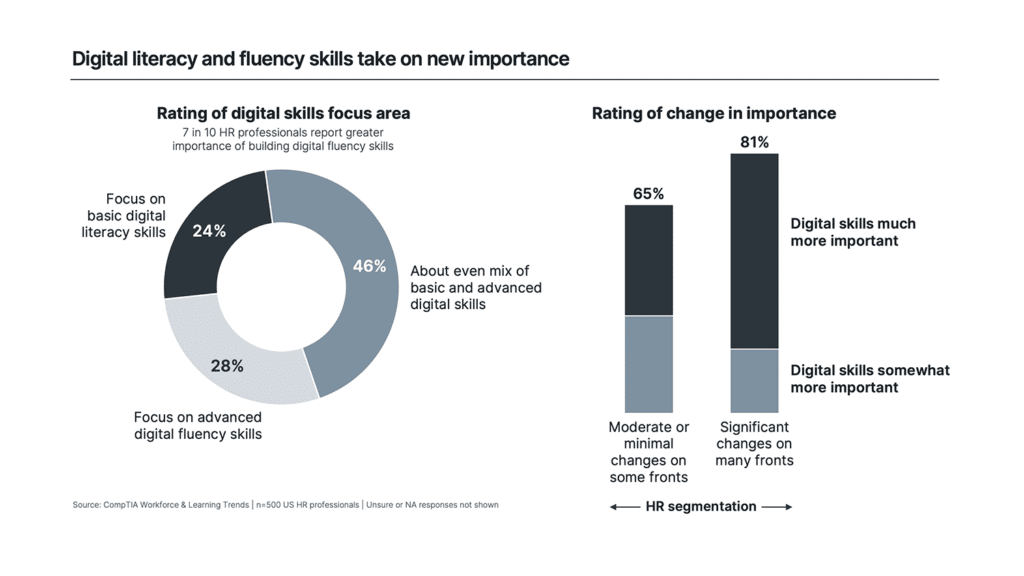Across the history of work, the balance of power between employers and employees swings back and forth like a pendulum. This was especially evident during the Great Resignation, when this pendulum swung decisively towards employees, providing them with the leverage to navigate toward their preferred jobs and work arrangements. However, the post-pandemic era marks a shift, as employers strive to pull the pendulum back to their side, highlighted by the resurgence of return-to-office (RTO) mandates.
Amid these changes, Gen Z is entering the workforce at a rapid pace; projections show that this new generation of workers is on track to outpace Baby Boomers in the workforce in 2024. This shift is further underscored by new research from the Upwork Research Institute, which highlights a significant trend: Gen Z is redefining traditional employment paradigms by increasingly forgoing conventional 9-to-5 jobs in favor of freelancing. According to the data, more than half (53%) of Gen Z freelancers are performing freelance work for at least 40 hours per week. Moreover, Gen Z professionals are motivated not only by financial stability but also by the desire for flexibility, autonomy and meaningful work.
This trend presents both opportunities and challenges for HR leaders who are looking to attract and retain top talent within this burgeoning workforce without reverting to rigid “employer-first” strategies.
3 ways to meet Gen Z where they are
To effectively engage Gen Z, employers must shift traditional 9-to-5 work paradigms and stop the swinging work pendulum altogether. Here are three ways to do just that.
Adopt a talent access mindset
To remain competitive and attract top talent, organizations need to adopt a “talent access” mindset that transcends conventional hiring and recruitment strategies. Gen Z demands flexibility and autonomy, which leads many to embrace new ways of working, including freelancing. This shift makes companies’ sole reliance on conventional “talent acquisition” strategies insufficient in meeting the evolving demands of this workforce. These strategies, which focus primarily on hiring full-time employees, are also time-consuming and costly. Instead, a “talent access” strategy, a nontraditional approach to talent solutions that leverage the larger workforce ecosystem inclusive of freelancers, is crucial in fulfilling business needs, particularly when the talent market is highly competitive, and projects require swift execution.
HR leaders have the opportunity to embrace these changes and build holistic and dynamic solutions to meet business needs, leveraging all of the talent and capabilities available, not just full-time headcount. They can spearhead this change by meeting Gen Z workers where they are today and prioritizing skills and needs over merely filling positions. In this way, organizations can fill talent gaps more quickly and cost-effectively while providing workers with a broader array of opportunities to match their diverse preferences and career aspirations.
Relinquish control
The increasing prevalence of freelance work, particularly among Gen Z, highlights the advantages it offers in terms of more flexible work models. This generation is at the forefront of a significant shift, challenging the constraints of traditional 9-to-5 employment. For those seeking alternatives, freelancing provides a degree of flexibility and autonomy that conventional jobs simply cannot offer.
The desire for control is a key factor motivating individuals to freelance. The research reveals that Gen Z professionals prioritize freelancing for several reasons: the flexibility to set their own schedules (70%), the opportunity to engage in work they are passionate about (62%), the ability to take charge of their personal development and career trajectory (61%) and the desire to work in environments free from the limitations of age, race or gender expectations (64%). This shift indicates a growing preference for having more autonomy over work conditions, clients and work hours.
For employers, this means adapting to a new workforce mindset that values flexibility and independence. By offering more flexible work arrangements, employers can attract top Gen Z talent, who are looking for opportunities that align with their lifestyle and career aspirations. This approach not only helps meet business needs but also fosters a more dynamic and engaged workforce as a whole.
Gen Z as a catalyst for AI adoption
According to recent data from Microsoft, 66% of leaders say they wouldn’t hire someone without AI skills. Historically, organizations have heeded this call by hiring full-time talent with AI skills dedicated to solving a particular problem or building the next innovation, but that traditional way of thinking misses a big opportunity to drive more efficiency in AI hiring and upskilling.
As data shows, Gen Z is not only willing to teach themselves the necessary skills to stay competitive but is also taking ownership of upskilling and reskilling in AI. Fifty-one percent of Gen Z professionals overall are adopting generative AI; however, Gen Z freelancers are adopting it at even greater rates (61%) compared to their Gen Z full-time employee counterparts (41%). Moreover, 39% of Gen Z freelancers have already obtained a specific certification for AI training.
Companies looking to adopt AI more quickly and innovate faster would be wise to consider leveraging the Gen Z freelance workforce. Leveraging this tech-savvy and adaptable segment of the workforce can not only accelerate AI integration but also increase adoption rates and efficiencies across the entire company for greater performance. By aligning with Gen Z freelancers’ propensity for AI, organizations can stay ahead in the competitive landscape and future-proof their operations, while simultaneously providing these workers with even more opportunities to build upon this skillset.
What’s important to recognize is that Gen Z is not just a new wave of workers but a catalyst for change in how we view work. The future of work is about evolving to meet the changing needs of a dynamic workforce, and Gen Z is at the forefront of this transformation. Yes, the pendulum of power will continue to swing, but with strategic adaptations, we can create a balanced and thriving way of working that benefits both employers and employees.
The post To win with Gen Z, HR must break these old employer-employee paradigms appeared first on HR Executive.

